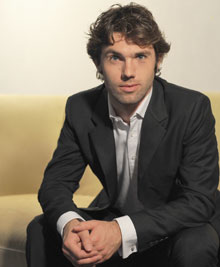Jean-Michaël Lavoie: A Career Takes Flight by Caroline Rodgers
/ March 1, 2012
Version française...
Flash version here
 As he turns thirty this month, Jean-Michaël Lavoie has no shortage of projects in mind. He is making a name for himself as an up-and-coming conductor, having made back-to-back debuts with world-famous orchestras over the past two years. After training abroad with musical greats in Europe and the United States, local audiences will now have the chance to see him in performance. As he turns thirty this month, Jean-Michaël Lavoie has no shortage of projects in mind. He is making a name for himself as an up-and-coming conductor, having made back-to-back debuts with world-famous orchestras over the past two years. After training abroad with musical greats in Europe and the United States, local audiences will now have the chance to see him in performance.
Like many youngsters, Lavoie took piano lessons as a child in Saint-Césaire, in Montérégie. Later, in high school, he directed his school’s choir. He went on to study music at McGill University, first completing a bachelor’s degree in musical theory and piano, followed by a master’s degree in conducting.
There, composer, professor and conductor Denys Bouliane took Lavoie under his wing for four years. “He gave me responsibilities and I conducted many concerts on top of my studies,” the musician explains. “I was able to gain experience quickly, especially in contemporary music. You could say that Denys Bouliane was the person who helped me the most at the start of my career.”
Between 2008 and 2010, Lavoie had the chance to conduct the Ensemble intercontemporain de Paris alongside one of music’s giants: Pierre Boulez.
“Contemporary music became one of my greatest strengths, and this opens the doors to major orchestras since few young conductors make this their speciality,” he says.
Winner of the 2010 Opus Prizes’ New Artist of the Year award, he signed a contract that same year with the International Classical Artists agency, which also represents Kent Nagano. He also directed the Los Angeles Philharmonic as part of the Dudamel Fellowship Program, which included several concerts for youth.
He enjoys conducting children’s concerts, something he has now done with three different orchestras. Besides the pedagogical aspect of these concerts, they are a great way to get to know an orchestra before tackling more demanding audiences. Last November, he conducted the OSM’s Le Petit Prince, a show destined for schoolchildren.
“Children react much more spontaneously; the dynamics are different than with a symphonic concert,” he says. “Although the program is reduced, there is great energy on stage and in the hall. We get to see the learning as it happens. I’m starting to notice the great work that orchestras are doing more and more often with young children in schools.”
Over the last year, Lavoie debuted with the OSM, the OSQ, the Toronto Symphony Orchestra, the BBC Orchestra, the National Arts Centre Orchestra, the Opéra de Rennes and the Orchestre d’Auvergne in France. As for upcoming debuts, expect to see him with the Orchestre national de Lille, the Opéra de Rouen and the Opéra de Bordeaux.
Technology in support of music
This month, he will conduct Tchaïkovski à l’heure du multimédia, a project including video projections, an actor on stage (Jack Robitaille) and a narrator. “It is a new experience meant to help audiences understand the symphony, with demonstrations on several levels accompanied by narration and images,” says the young maestro, who doesn’t hesitate to participate in these types of concerts.
“Technology helps us reach our audience, enlivening and animating the concert,” he adds. “This meets the needs of audience members who aren’t regular orchestra-goers, allowing us to build bridges with them and get them interested in knowing more about classical music. In the first part of the concert, the narration accompanies extracts of the piece played by the orchestra, and in the second part, we play the symphony in its entirety. I think this approach is better than leaving a novice public alone with nothing but the program notes.”
Technology can also support bold creations, even in the oldest of concert halls. This was the case at Milan’s La Scala last April, when he took part in the premiere of Quartett, anopera by Luca Francesconi, an Italian composer currently in the spotlight. Based on the play with the same name by Heine Müller, itself adapted from Laclos’ Les Liaisons dangereuses, the piece requires two orchestras and only two characters inside a box, suspended in the air by cables.
While another conductor directed the main orchestra in the pit, Lavoie, in a room on another floor, directed a second orchestra of 80 musicians with a chorus of 40 singers, invisible to the public, and whose role was to musically echo the thoughts and feelings of the protagonists. The audio was retransmitted by speakers encircling the audience, and Lavoie had to keep visual contact with the lead conductor while still keeping his eyes glued to a screen in order to keep everything synchronized.
“I didn’t expect to have the chance to spend two months in Milan, and it was a great challenge to participate in this premiere given its technological constraints. It was also my first experience with the opera, which I really enjoyed. The audience loved it. I conducted six shows. “
He admits he’s been bitten by the opera bug. “I fell in love with it and I definitely want to develop that aspect of my career over the next few years.”
Conducting the OSQ: Tchaïkovski à l’heure du multimédia, March 21, Grand Théâtre de Québec
www.osq.org
Translation: Lindsay Gallimore
Version française... | 

